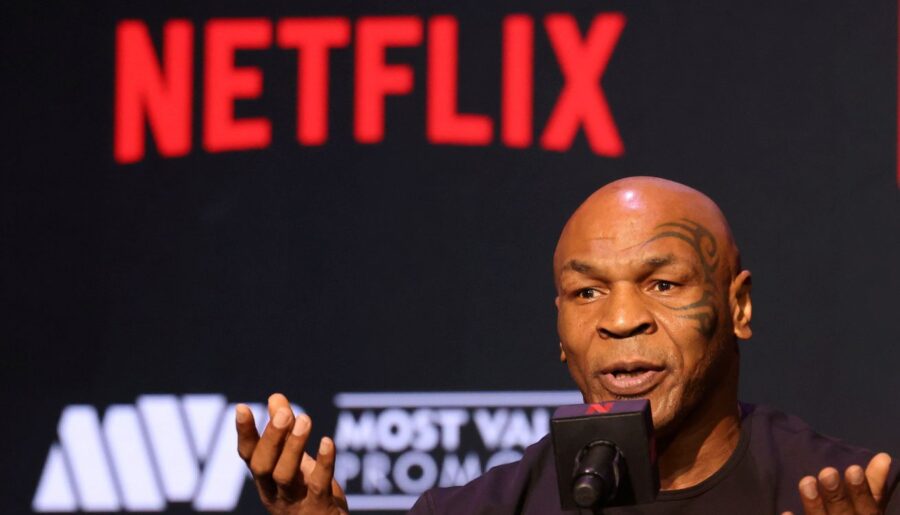Mike Tyson | Photo By Ed Mulholland / Sportsfile via Getty Images
Mike Tyson has experienced the highest of highs in the sport of boxing and remains one of fighting’s most popular figures. But he wants everyone to know that his success came with a cost.
Hundreds of thousands of words and hours upon hours of footage have been dedicated to chronicling the onetime heavyweight king’s life, with the lines between reality and legend often being blurred. Tyson, 58, adds another chapter to his story on Nov. 15 when he competes in a pro bout for the first time in 19 years to take on influencer boxer Jake Paul at AT&T Stadium in Arlington, Texas.
Ahead of that contest, Tyson sat down with fellow boxing legend Andre Ward on The Art of Ward podcast for a candid interview. Tyson was asked to reflect on becoming the youngest heavyweight champion at 20 years old and his response was short.
“I don’t wish that on no one,” Tyson said. “I don’t wish that, no. I don’t wish my life on no one. As a whole.”
“I wanted it all,” Tyson added. “I wanted to be the biggest fighter in the history of life. That’s what [Tyson’s former coach and mentor] Cus [D’Amato] put in my mind. How do I know to say those words, he put that in my mind.”
Tyson became one of the most famous athletes in the world when he defeated Trevor Berbick in 1986 to claim the WBC heavyweight title. His knockout power became the stuff of legends and two years later, he needed a little more than 90 seconds to destroy Michael Spinks and become boxing’s lineal champion.
A highly publicized fall from grace followed, including a shocking upset to Buster Douglas in 1990 and then a conviction for rape in 1992 that resulted in Tyson serving three years in prison. More recently, Tyson and his family suffered a terrible tragedy in 2009 when Tyson’s four-year-old daughter died following an accident at their home in Phoenix.
Tyson has dealt with deep personal wounds throughout his life, some self-inflicted, and it’s only over the past 15 years that he has been embraced again as an elder statesman of the combat sports world. He recalled his first comeback in 1995, after his release from prison, and how it wasn’t the success it appeared to be on the surface.
“I was still caught up,” Tyson said. “It was the same thing. But after everything went, I lost all my money on everything. I went on drugs, got drinking a lot, went through all my AA programs, my sex addiction program and then I realized now I’m starting over with nothing, but I’m starting with experience now. So now my financial life and my personal life is totally different than it was when I was champion.”
“I was just escaping,” Tyson added. “Shame, embarrassment, I think self shame and stuff. Wanting to die, wanting to kill myself and all that crazy stuff. I just had too much in me. I had too much left in me. I wanted to do something else. And I think my ego had a little bit influence, ‘I can still do this, let me do this, let me go into movies. Let me do this, let me do that.’ But all the stuff that I succeeded in, being on Broadway, doing movies, it’s nothing like fighting. I don’t care how much money they give you. I’d fight for free rather than get paid for a Hollywood gig, it’s not the same.”
At one of his lowest points, the months following his loss to Douglas, Tyson says he still felt that he had a support system; however, he realizes now that it was only because his shine hadn’t worn off just yet.
“No, not really, because I still had money,” Tyson said. “They scattered when they finished with your money. That’s when they scatter.”
“Enemy can’t hurt you,” Tyson added. “Only your friend. … It doesn’t come easy. I prepare for an expiration date. All this stuff is preparing us for an expiration date. When we die, then we die because we know we had truly lived. That’s a good time to die. I don’t know if I’m afraid of death, but I don’t cling to life. We all know we have to go but until that moment comes, we have to do a lot of things.”
Tyson vs. Paul takes place Nov. 15 and airs live exclusively on Netflix.

